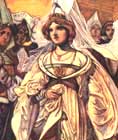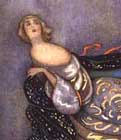
Cinderella:
345 Variants
by Marian
Roalfe Cox
SurLaLune's
Cinderella Area
SurLaLune Fairy Tales Main Page
322
Dragomanov, M., Malorusskiya Narodnuiya predaniya i razskazy. (Legends and Popular Tales of Little Russia). Kiev, 1876. Pp. 262-67.
"KORSBURY-POPELJUH"
(Dirty Cinder-boy).1
ABSTRACT
Despised youngest son nicknamed Popeljuh-- Hearth abode-- Sea-horses spoil king's fields; hero catches three of them, and keeps them hidden-- Princess as prize to any rider who can jump as high as second storey of castle-- Hero reaches second storey; receives ring and handkerchief; kisses princess; escapes home, and sits in ashes-- Wedding of princess celebrated after a year's time-- Happy marriage-- Hero again escapes-- War against king-- Hero secures his victory; is reunited to bride.
TABULATION
(1) A king has three sons, two clever, and the youngest stupid. He is always in the cinders, and spends his time in amusing himself.-- (2) But when the sea-horses [miraculous horses that come forth every night from the sea] spoil the king's fields, Popeljuh catches three of them, and keeps them in his gable without saying a word to anyone.-- (3) Another king from beyond the Red Sea proclaims that whosoever, on horseback, can jump as high as the second storey of the castle shall wed his extremely beautiful daughter. Popeljuh leaps up to the second storey, and gives a sing and a handkerchief to the princess, kisses her, and escapes back home, where he sits in the ashes and pretends to know nothing.-- (4) After a year the king announces his daughter's wedding. Popeljuh gives a horse to each of his brothers, mounts the third himself, and rides to the wedding.-- (5) He is married to the princess, but again escapes. Three kings declare war against his father-in-law. Popeljuh gains a victory, and is reunited to his wife.
NOTES
Note 71
(P. 449.) The following story was amongst the number selected for me by Dr. Karlowicz. It seems rather to belong to the "Puss-in-Boots" type, the title alone suggesting likeness to the Cinderella group:--
E. Romanov, Byelorussky Sbornik (Recueil blanc-ruthenien), 5 vols. Kieff et Witebsk, 1885-91. Vol. iii, pp. 226-27, (From the village of Slidce, near Lukomla, in the district of Sienno, Government of Mohilew.)
"POPELYSKA"
(from popel, "ashes").
The youth Popelyska who is always in the ashes of the hearth, has a cat which lives on the stove. Cat proposes to marry his master to the daughter of Thunder and Lightning, and goes to Thunder to arrange the marriage. On the way back he tells Mr. Serpent's mowers that when Mr. Thunder passes by with his suite they must say that they work for Mr. Popelyska; he gives the same directions also to the haymakers and to the herdsmen. Cat calls on Mr. Serpent at his palace, and tells him that Mr. Thunder will be passing shortly, and unless he hides himself in the hollow oak he is certain to be burnt. After the wedding they all set out for Mr. Popelyska's. The labourers reply that they belong to Mr. P. The cat leads the guests to the palace of Mr. Serpent, saying it is the estate of Mr. P., who, he tells Thunder, is much annoyed by the serpent's proximity, and he shows him his hole. Thunder and Lightning send a thunder-bolt at the oak; Serpent is struck dead and burnt up. Popelyska lives happily at the castle, and the cat becomes his steward.
The cat plays a prominent part as benefactor in Nos. 11, 39, 71, and 121.
I here give brief abstracts of three more of the stories for which I am indebted to Dr. Karlowicz. The Cinderella element in them is not sufficiently prominent to warrant their inclusion amongst the other variants.
Ch. Balinski, Powiesci ludu (Folk-tales). Edited by K. W. Wojcicki. Warsaw, 1842. Pp. 95-104.
"PAN KOZUSZEK."
(Mr. Sheepskins).
A young and wealthy gentleman loses his fortune, and becomes a soldier under the king. He is so very poor that he wraps himself up in a sheepskin cloak, whence his name. King's daughter is carried off by a robber, who lives underground. The soldier delivers the princess, and, after numerous adventures, marries hers.
Sadok Baracz. Bajki, fraszki, podania, etc. (Contes, etc., de la Ruthenie), Tarnopol, 1866. Pp. 118-25.
"THE LANTERNS."
A poor widow has a good-for-nothing son. A sorcerer comes and takes him away under pretext of teaching him something. He sends him into subterranean regions to fetch him old lanterns. Hero falls asleep there and sleeps seven years. Having found the lanterns and other talismans, he returns above ground. The king, learning that hero possesses talismans and riches, wants to marry him to his daughter, but first imposes difficult tasks, which hero accomplishes with the aid of his talismans. He marries the princess and lives happily. The sorcerer hearing all this, appears on the scene to ruin his whilom pupil, takes his lanterns away, and reduces him to poverty. But certain grateful beasts come to his assistance and restore him to wealth and happiness. The sorcerer perishes of hunger on his glass mountain.
N.B.--The good-for-nothing son is always asleep in the ashes of the stove, and goes to the king dirty and ill-clad.
A. J. Glinski, Bajarz polski, 4 vols., 2nd ed. Wilna, 1862. Vol. i, pp. 38-66, No. 2.
"SILLY JOHN; HIS HORSE, HIS QUAIL, AND HIS PIG."
An old sorcerer, in dying, bequeaths to Silly John, his youngest son, a knowledge of witchcraft, and a horse, a quail, and a pig. A king has three daughters, and promises to give the youngest to the victor at the tournament. Aided by his magic beasts John is victorious, though his brothers think him silly, and though he passes all his time by the stove.
[A long story, embracing a mass of incidents].
It may be well to add in outline two stories not infrequently referred to as Cinderella variants:--
Otto Knoop, Volkssagen, Erzählungen und Märchen aus dem Oestlichen Hinterpommern. Posen, 1885. Pp. 192-194.
IV.--"DER DUMME HANS."
Youngest son, with magic flutes, scales glass mountain to win princess. He gives her a ring, by means of which he is recognised when, after a yeas's interval, he returns for his bride.
Heinrich Pröhle, Kinder- und Volksmärchen. Leipzig, 1853. No. 10.
"DER GEIST DES RINGES UND DER GEIST DES LICHTES."
Widow's son gets lost at the age of fifteen. He becomes possessed of light and ring, which are talismans. He does not hide his head as commanded, when princess is carried through the town, but sees her and woos her. After performing tasks he weds her.
The following separate motifs of the Cinderella story have been pointed out to me by Dr. Karlowicz:--
Wojcicki, Klechdy, etc., ii, 83. A king's daughter must become a servant for a whole year, in order to deliver a young man, who has been transformed through enchantment into a crow.
Kolberg, Lud. Krakowskie, 114-117. Here we find Cinderella in the role of sister-of-mercy in a soldier's hospital. A young prince is wounded, and recognises the princess in the nurse who attends him at the hospital.
Zbiör wiadomosci, etc., vol. xi, pp. 270-272. A beautiful story, taken down in Polish by Dr. Karlowicz, in 1869, (From the district of Lida, Government of Wilna.) In order to humiliate a haughty princess, a king's son takes service as under-gardener at the palace of her parents. Thus he plays a role equivalent to that of Cinderella; and in the end he is triumphant.
In the history of Polytechnos and Aedon, Chelidon, her sister, is forced to become a sort of Cinderella, slave and servant.
In a Talmudic story, King Solomon, robbed by Asmodeus of his magic ring, is compelled to take service as scullion at the court of the king of the Ammonites; after a time he becomes the lover of the king's daughter. Veselovsky, Slavyanskiya, skazaniya o Solomonye i Kitovrasye (Slavonic legends of Solomon and of Kentauros-[in Russian]). Petersburg, 1872. Pp. 110-11. Cf. Varnhagen, Ein indisches Märchen, Berlin, 1882. Pp. 19-20. Return to place in text.
Cox, Marian Roalfe. Cinderella: Three Hundred and Forty-five Variants of Cinderella, Catskin, and Cap O' Rushes, abstracted and tabulated. London: David Nutt for the Folklore Society, 1893.
While the original text of this book is out of copyright, the special formatting and compilation available on SurLaLune Fairy Tales is copyrighted. Be aware that while the original content has been honored, page numbering, footnote numbering, redesigned charts, links, and other aspects are unique to this site's version of the text. Use at your own risk. For private and fair use educational purposes only.
©Heidi
Anne Heiner, SurLaLune Fairy Tales
E-mail: surlalune@aol.com
Page last updated March 2, 2006
www.surlalunefairytales.com










